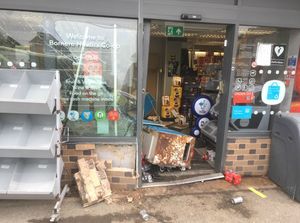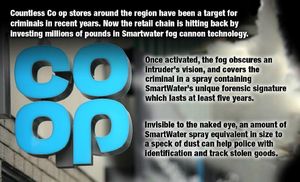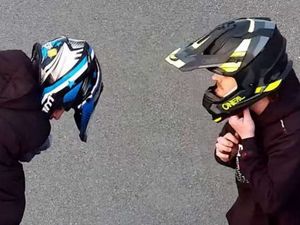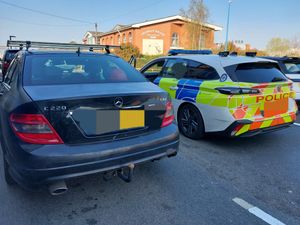Co-op spends £70 million to fight crimewave
More than £70 million is being spent by the Co-op as part of a fightback against robbers.

Co-operative Group Limited says it is determined to protect staff and will be fitting devices including SmartWater and fog cannons to its stores across the West Midlands.
It follows a series of raids across the region in which staff have been threatened by gangs who steal cash or high-value goods like cigarettes and alcohol.
The store group has joined forces with SmartWater, which is based in Telford, as part of attempts to step up security.
Last week a gang broke into Co-op’s Bomere Heath store near Shrewsbury but failed to remove the cash machine.

Earlier this month, five men were jailed for a plot to break into cash machines at shops around the country.
The gang had netted more than £1.1 million from their efforts – and prosecutors believe that there were actually 12 people involved in the attacks altogether.
The 30 burglaries stretched from June 2017 to September 2018, and led to more than £200,000-worth of damage to shops.
It is, therefore, hardly surprising that supermarkets want to take action against criminals targeting cash points.
The Co-operative Group has now announced plans to pump more than £70m into the fight against crime.
The company is investing millions in new forensic liquid technology and is joining other retailers in helping Telford based security firm SmartWater to develop a fog cannon. The cannon will also be aimed at protecting tobacco and alcohol counters from attacks as well as staff. It makes it impossible for raiders to see anything and leaves them covered in SmartWater that can link them to the crime scene.
Meanwhile, a special gel is being installed inside cash machines to leave marks on thieves in a bid to ensure they are successfully prosecuted at court when caught.
Some of the money is being spent on state-of-the-art interactive and remote monitored CCTV, covert trackers and other methods to deter and disrupt criminal activity.
Safety
In addition the Co-op has now stopped selling kitchen knives in its branches, except for cutlery and electric knives.
Andrew Needham, Co-op’s head of retail loss and costs, said: “Safety and security is our number one priority.
“We know that violence and crime is about much more than statistics, it is about its impact on people’s lives and the communities in which they live and work.
“As a community-based organisation we see the impact of social issues in our stores, and we’re committed to playing our part and working together to do all we can to protect colleagues and make our communities safer.”
The move is part of the Co-op’s multi-million pound investment in technology aimed at keeping people safe under its Safer Colleagues, Safer Communities campaign set up to address violence and crime.
Co-op Food chief executive Jo Whitfield said: “Violence and crime damages the fabric of our society and as a responsible retailer, which is focussed on helping to protect colleagues and make our communities safer, we felt it was the right thing to do to remove from sale single knives.
“We see the impact on people’s lives and we’re committed to playing our part and doing all we can.
“It’s why we are a major supporter of the Respect for Shopworkers campaign and why we are using our own community fund to support causes which tackle the issue.”
The case which saw the five gang members jailed at Shrewsbury Crown Court involved other criminal gangs supplying the thieves with stolen high-performance getaway cars to keep detectives off their scent. Martin Steadman, 34, of Luce Road, Low Hill, Wolverhampton, was jailed for seven years and six months; Michael Stubbs, 32, of Asheridge Close, Wednesfield, was jailed for six years and eight months; Mahneer Khan, 31, of Great Hampton Street, Whitmore Reans, also Wolverhampton, was jailed for four years and 10 months; Noel Reilly, 39, of Barnes Hill, Weoley Castle, was jailed for seven years and six months; and Marcus Burton, 33, of Mayfarm Close, Hollywood, also Birmingham, was jailed for five years and 10 months.
But they are hardly unique. Last year Jason Pallas, 41, was jailed for four years thanks to DNA proof that linked him with a gang of up to five masked criminals who used a digger to strike at Lloyds Bank in Cleobury Mortimer in December 2015.
They tore a cash machine containing about £25,000 out of the wall and fled.
Convictions
Then there was the incident in 2014, in which three robbers who raided Co-op stores across the West Midlands and Shropshire were also locked up. Amandeep Singh, Jani Wright and Ryan Shaw, all from Birmingham, stole almost £35,000 in their spree which targeted 15 shops.
All admitted conspiracy to rob stores including Co-ops in Bridgnorth, Telford, Kidderminster, Walsall and Cheslyn Hay, in Staffordshire, between January and November 2012.
The shops will not be the first to make use of the DNA technology.
The Metropolitan Police has used it to cut burglaries in the capital, and Network Rail has also introduced SmartWater to help prevent metal thefts from tracks.
Florian Mattinson, managing director of Telford’s SmartWater Technology Limited, said: “With hundreds of criminal convictions to date and a 100 per cent conviction rate in court, criminals are aware of our ability to place them at the scene of a crime.
“This crime-beating innovation is the result of a joint venture between the market leaders in forensic and fogging technology.
“Following the successful roll-out of SmartWater to Co-op’s ATM estate, this fog represents a further significant step in retail security in communities, one which combines deterrence, vision-obscuring fog and traceability.
“Simply put, this technology represents an even greater deterrent to criminals.”





